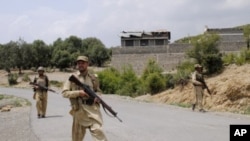Pakistan’s military is criticizing a U.S. decision to suspend hundreds of millions of dollars in military assistance to Pakistan. Relations between the United States and Pakistan have been frayed since the covert U.S. raid that killed Osama bin Laden. Some analysts say the decision to suspend aid to Pakistan will only further hurt bilateral ties.
The White House confirmed Sunday that $800 million, roughly one-third of the annual U.S. security assistance to Pakistan, would be suspended.
News reports quote unnamed American officials who say Pakistan's lack of cooperation and insufficient efforts on counterterrorism led to the suspension.
Islamabad recently expelled more than 90 American military trainers from the country and tightened visa procedures for CIA officials.
Pakistani army spokesman Major-General Athar Abbas dismissed the criticism Monday, and in turn lashed out at the U.S. decision.
“The provision of aid with conditions is not acceptable," said Abbas. "We don’t have to qualify on [a] daily basis and remain in the talk that when we qualify only then it [aid] will be resumed or it will be provided. “
The military spokesman reiterated that terrorism threatens both Pakistan and the United States, and that defeating the common enemy is in the interest of the two countries and the rest of the world.
General Abbas also noted that the suspension of U.S. military aid will not impact tens of thousands of Pakistani troops currently conducting operations against Taliban and al-Qaida-linked militants in the country's volatile tribal region bordering Afghanistan.
“We have always claimed that we are conducting these operations without any external support whatsoever," he said. "We are using our own resources; these are indigenous equipment, ammunition, fuel and other resources. So we will continue with that because we feel very strongly that this is a common enemy, a common threat which are affecting us as well as rest of the world.”
But some analysts say the suspension in aid will have an impact on the already deteriorating relations between the United States and Pakistan.
Former Pakistani ambassador to Washington, Maleeha Lodhi, says such punitive actions by the United States may not be productive in the long run.
“Punitive actions are a blunt instrument of policy and they really also signify the failure of American diplomacy because if that is all the U.S. can do now to elicit Pakistan’s cooperation then I think it is actually giving Pakistan not an incentive to cooperate but a disincentive to cooperate," said Lodhi. "So I think the surprising thing is that the U.S. should take this action at a time when it should really be stepping back from the brink and trying to improve the relationship.”
Ties between the United States and Pakistan have been severely strained since U.S. special forces killed al-Qaida leader Osama bin Laden on May 2 in the Pakistani city of Abbottabad.
Pakistan criticized the U.S. operation as a violation of its sovereignty, while U.S. officials questioned how bin Laden was able to hide out in Pakistan for several years without being detected.
Former Pakistani Ambassador Lodhi says there is a need now for both the United States and Pakistan to find enough common ground to pursue their shared objectives, instead of taking steps that would hurt any gains that have already been made in the joint war against terrorism.
White House Chief of Staff William Daley told ABC's This Week program Sunday that Pakistan has taken some steps that have given the United States reason to pause some of its aid to the military. He said while the U.S. relationship with Pakistan is difficult and complex, it must be made to work over time.




